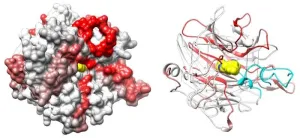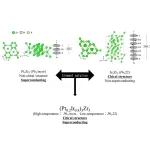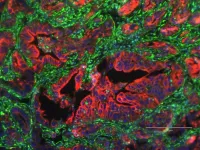(Press-News.org) Research Highlights:
The weight loss medication tirzepatide significantly lowered the systolic blood pressure of nearly 500 adults who had obesity and took the medication for 36 weeks, or about eight months, in a subset of an international clinical trial.
Participants taking 5 mg of tirzepatide had an average systolic blood pressure reduction of 7.4 mm Hg; participants taking 10 mg had an average systolic blood pressure reduction of 10.6 mm Hg; and participants taking 15 mg had an average systolic blood pressure reduction of 8.0 mm Hg.
In this study, the blood-pressure lowering effects of tirzepatide were evident during both day and night blood pressure measurements.
Embargoed until 4 a.m. CT/5 a.m. ET Monday, Feb. 5, 2024
DALLAS, Feb. 5, 2024 —The new weight loss medication tirzepatide significantly lowered the systolic blood pressure (the top number in a blood pressure reading) for nearly 500 adults with obesity who took the medication for about eight months, according to new research published today in Hypertension, an American Heart Association journal.
Systolic blood pressure, or the top number in the blood pressure reading, is a stronger predictor for cardiovascular death than diastolic, or bottom number, blood pressure. According to the American Heart Association’s 2024 Heart Disease and Stroke Statistics, more than 122 million adults in the United States, or 47% of adults have hypertension, and nearly 42% of adults have obesity.
Tirzepatide works by mimicking two metabolic hormones in the body: it acts as a glucagon-like peptide-1 (GLP-1) receptor agonist and also as a glucose dependent insulinotropic polypeptide (GIP) receptor agonist. These hormones stimulate insulin secretion and sensitivity after a person eats. Together, they have been found so far to help regulate the body’s blood sugar levels, slow down digestion and reduce appetite, which makes a person feel more full and eat less, leading to weight loss. In contrast, semaglutide has only the GLP-1 hormone; it does not contain a GIP receptor agonist.
In 2022, the Food and Drug Administration approved tirzepatide for prescription as a treatment for Type 2 diabetes. In late 2023, the FDA also approved it for chronic weight management for people with obesity (body mass index of 30 kg/m2 or higher) or overweight (body mass index of 27-29 kg/m2) and at least one weight-related health condition, such as high blood pressure, Type 2 diabetes or high cholesterol.
“Our findings indicate treating obesity with the weight loss medication tirzepatide may be an effective strategy for preventing or treating high blood pressure,” said lead study author James A. de Lemos, M.D., FAHA, the Kern Wildenthal, M.D., Ph.D., distinguished chair of cardiology and a professor of medicine at UT Southwestern Medical Center in Dallas. “Although tirzepatide has been studied as a weight loss medication, the blood pressure reduction in our patients in this study was impressive. While it is not known if the impact on blood pressure was due to the medication or the participants’ weight loss, the lower blood pressure measures seen with tirzepatide rivaled what is seen for many hypertension medications.”
The current research was a planned sub-study including 600 of the participants from the SURMOUNT-1 weight loss study to determine if there was an effect on blood pressure. The sub-study was designed to assess the effects of tirzepatide on blood pressure levels as measured by 24-hour ambulatory blood pressure monitoring in people with obesity but without Type 2 diabetes.
Participants received either a placebo or a dose of tirzepatide in one of three strengths (5 mg, 10 mg or 15 mg). About one-third of participants reported they had high blood pressure at the beginning of the study and were taking one or more hypertension medications. When the sub-study began, all of the participants had blood pressure levels that were less than 140/90 mm Hg, and if they used blood pressure medications, they were required to have been taking their blood pressure medications for at least three months. The sub-study included participants who had hypertension and who had normal blood pressure.
The study was conducted from December 2019 to April 2022, and the participant results after 36 weeks of taking tirzepatide indicate:
For participants taking 5 mg of tirzepatide, there was an average reduction in systolic blood pressure of 7.4 mm Hg.
For participants taking 10 mg of tirzepatide, there was an average reduction in systolic blood pressure of 10.6 mmHg.
For participants taking 15 mg of tirzepatide, there was an average reduction in systolic blood pressure of 8.0 mm Hg.
The blood-pressure lowering effects of tirzepatide were evident in blood pressure measures taken during both the day and night. Nighttime systolic blood pressure is a stronger predictor for cardiovascular death and all-cause death than daytime blood pressure readings.
The reductions in systolic blood pressure were consistent across subgroups of participants in the study who were categorized by additional factors, including age, sex, body mass index and hypertension-related risk factors.
Study background and details:
SURMOUNT-1 was a randomized study on the effect of increasing doses of tirzepatide on weight loss. It found that in participants with overweight or obesity (body mass index (BMI) ≥27 kg/m2), once-weekly injections of 5 mg, 10 mg or 15 mg of tirzepatide led to mean weight reductions of 15%, 19.5% and 20.9%, respectively, compared to placebo.
The sub-study included 600 adults from SURMOUNT-1: 155 participants received placebo; 145 were taking tirzepatide 5 mg; 152 were taking tirzepatide 10 mg; and 148 were taking tirzepatide 15 mg.
Blood pressure measurements were available and analyzed for 494 participants who valid ambulatory blood pressure monitoring data at the beginning of the study and at week 36.
Only the study participants with at least 70% valid readings on ambulatory monitoring and a minimum of 20 daytime and seven nighttime readings were included in the data analyses. This was 494 out of 600 initial participants.
69% of study participants self-identified as female, and 31% self-identified as male. 66.8% self-identified as white adults, 11.8% self-identified as Black adults and 25% self-identified as Hispanic ethnicity.
The average age of the participants was 45.5 years, and their average BMI was 37.4 kg/m2, which meets the criteria for obesity (obesity is BMI≥30). People with obesity have an increased risk of high blood pressure, heart disease, stroke and Type 2 diabetes, as well as other health conditions.
Ambulatory blood pressure monitoring used in this study included blood pressure measurements every 30 minutes during the day and every hour at night, providing a more comprehensive assessment of blood pressure than in office or daily home blood pressure measurements. For ambulatory blood pressure monitoring, study participants wore a blood pressure monitoring device for a 24- to 27-hour period that measured blood pressure throughout waking and sleeping hours. Ambulatory blood pressure monitoring was conducted when participants first began taking tirzepatide at the start of the study and after 36 weeks of being enrolled in the study.
The 2017 ACC/AHA Guideline for the Prevention, Detection, Evaluation, and Management of High Blood Pressure in Adults classifies hypertension, or high blood pressure, as having top and bottom blood pressure measures greater than or equal to 130/80 mm Hg.
Study limitations include that it was only conducted in a subset of the original 2,539 SURMOUNT-1 participants; the ambulatory blood pressure monitoring was only measured at two points in the study — baseline and at 36 weeks; and measurements were only taken once per hour at night to minimize the burden on study participants. In addition, changes in food intake and 24-hour urine sodium excretion were not assessed, meaning the contribution of dietary modifications including salt intake or other changes that may help to reduce blood pressure are unknown and cannot be estimated.
“Overall, these data are encouraging that novel weight-loss medications are effective at reducing body weight and they are also effective at improving many of the cardiometabolic complications of obesity including hypertension, Type 2 diabetes and dyslipidemia, among others. While the impact of each of these beneficial effects is individually important, many of these obesity-related complications act synergistically to increase the risk of cardiovascular disease. Thus, strategies that mitigate multiple obesity-related complications may reduce the risk of cardiovascular events,” said Michael E. Hall, M.D., M.S., FAHA, chair of the writing group for the Association’s 2021 scientific statement on weight-loss strategies for prevention and treatment of hypertension and chair of the department of medicine at the University of Mississippi Medical Center in Jackson, Mississippi.
“Additional studies will be necessary to determine the long-term impact on cardiovascular events such as heart attack and heart failure. Also, studies are needed to investigate what happens to blood pressure when medications like tirzepatide are discontinued – does the blood pressure rebound and go back up, or does it remain lowered?” Hall concluded.
Co-authors and disclosures are listed in the manuscript. The study was funded by Eli Lilly and Company, the manufacturer of tirzepatide.
Studies published in the American Heart Association’s scientific journals are peer-reviewed. The statements and conclusions in each manuscript are solely those of the study authors and do not necessarily reflect the Association’s policy or position. The Association makes no representation or guarantee as to their accuracy or reliability. The Association receives funding primarily from individuals; foundations and corporations (including pharmaceutical, device manufacturers and other companies) also make donations and fund specific Association programs and events. The Association has strict policies to prevent these relationships from influencing the science content. Revenues from pharmaceutical and biotech companies, device manufacturers and health insurance providers and the Association’s overall financial information are available here.
Additional Resources:
Multimedia is available on the right column of release link https://newsroom.heart.org/news/new-weight-loss-medication-may-help-lower-blood-pressure-in-adults-with-obesity?preview=d243afa0d688903a208b5e2d183fb16b
After February 5, view the manuscript online.
AHA news release Weight-loss drug reduced secondary CV risk in people with overweight or obesity without diabetes (November 2023)
AHA scientific statement: Obesity and Cardiovascular Disease (April 2021)
AHA health information: Understanding Blood Pressure Readings
AHA health information: Why Lose Weight
Follow AHA/ASA news on X (formerly known as Twitter) @HeartNews
Follow news from AHA’s Hypertension journal @HyperAHA
###
About the American Heart Association
The American Heart Association is a relentless force for a world of longer, healthier lives. We are dedicated to ensuring equitable health in all communities. Through collaboration with numerous organizations, and powered by millions of volunteers, we fund innovative research, advocate for the public’s health and share lifesaving resources. The Dallas-based organization has been a leading source of health information for a century. During 2024 - our Centennial year - we celebrate our rich 100-year history and accomplishments. As we forge ahead into our second century of bold discovery and impact, our vision is to advance health and hope for everyone, everywhere. Connect with us on heart.org, Facebook, X or by calling 1-800-AHA-USA1.
END
New weight loss medication may help lower blood pressure in adults with obesity
Weight loss medication reduced both day and nighttime blood pressure levels, finds new study in the journal Hypertension
2024-02-05
ELSE PRESS RELEASES FROM THIS DATE:
Study finds new treatment to reverse inflammation and arterial blockages in rheumatoid arthritis
2024-02-05
UNDER STRICT EMBARGO UNTIL 10AM (UK TIME) ON MONDAY 5 FEBRUARY 2024
Researchers from Queen Mary University of London have found that the molecule RvT4 enhances the body’s natural defences against atherosclerosis (hardening of the arteries) in patients with rheumatoid arthritis.
Studies in mice undertaken by researchers from Queen Mary University of London’s William Harvey Research Institute and Centre for Inflammation and Therapeutic Innovation, and funded by the European Research Council (ERC) and Barts Charity, shows that increasing levels of the RvT4 molecule in the body improves the ability of the body’s own defence ...
Improving climate predictions by unlocking the secrets of soil microbes
2024-02-05
Climate models are essential to predicting and addressing climate change, but can fail to adequately represent soil microbes, a critical player in ecosystem soil carbon sequestration that affects the global carbon cycle. A team of scientists led by the Department of Energy’s Lawrence Berkeley National Laboratory (Berkeley Lab) has developed a new model that incorporates genetic information from microbes. This new model enables the scientists to better understand how certain soil microbes efficiently store carbon supplied by plant ...
City of Hope preclinical study uncovers two proteins’ crucial role in causing cancer cell growth
2024-02-05
FINDINGS
Scientists at City of Hope®, one of the largest cancer research and treatment organizations in the United States, have discovered a new cellular mechanism that plays an important role in cancer cells’ ability to cause disease. The study was published in Nature Structural & Molecular Biology today.
A team led by Chun-Wei (David) Chen, Ph.D., an associate professor of systems biology at City of Hope, pinpointed two cell-surface proteins, integrin αV and β5, that partner to spur cancer cell growth. The researchers next identified a region of integrin αV called the β-propeller domain ...
Immune response, not acute viral infections, responsible for neurological damage, McMaster researchers discover
2024-02-05
For years, there has been a long-held belief that acute viral infections like Zika or COVID-19 are directly responsible for neurological damage, but researchers from McMaster University have now discovered that it’s the immune system’s response that is behind it.
The research, published on Feb. 5, 2024 in Nature Communications, was led by Elizabeth Balint, a PhD student at McMaster, and Ali Ashkar, a professor with the Department of Medicine and the Canada Research Chair in Natural Immunity and NK Cell Function.
“We were interested in trying to ...
Scientists mix and match properties to make new superconductor with chiral structure
2024-02-03
Tokyo, Japan – Researchers from Tokyo Metropolitan University have created a new superconductor with a chiral crystalline structure by mixing two materials, one with superconductivity but no chirality, another with chirality but no superconductivity. The new platinum-iridium-zirconium compound transitions to a bulk superconductor below 2.2 K and was observed to have chiral crystalline structure using X-ray diffraction. Their new solid solution approach promises to accelerate the discovery and understanding of ...
Cary Institute receives NSF funding to offer ecological research experiences for teachers
2024-02-03
(Millbrook, NY) Cary Institute for Ecosystem Studies is launching a new program to support high school and middle school educators in teaching global change and ecology. Starting in the summer of 2024, nine teachers will spend six weeks at Cary Institute conducting collaborative research in ecosystem science. Follow-up meetings throughout the school year will support the teachers as they develop and implement innovative curricula based on their research experiences.
The program is funded by a three-year award from the National Science Foundation as part of its Research ...
California voter poll: Schiff leads, while Porter and Garvey neck-and-neck for second in the U.S. Senate primary
2024-02-03
U.S. Rep. Katie Porter and former Los Angeles Dodger Steve Garvey are deadlocked in the race for second place in the U.S. Senate primary in California, according to a new poll on California politics and policies from USC; California State University, Long Beach; and Cal Poly Pomona.
U.S. Rep. Adam Schiff, a Democrat, leads all candidates with 25% of likely voters, according to the California Elections and Policy Poll. Porter, a Democrat, and Garvey, a Republican, each received support from 15%. Other candidates are in single digits, with Democratic U.S. Rep. ...
Researchers identify protein linked to metastasis in pancreatic cancer
2024-02-03
Pancreatic cancer is the No. 3 cause of cancer-related deaths in the United States, and only 12% of patients survive five years after being diagnosed. Severe pancreatic cancer is associated with metastasis, and it is this spread of secondary tumors that usually causes death, but little is known about the molecular mechanisms that drive metastasis.
In a study published Dec. 18 in Advanced Science, researchers from the University of California, Davis showed that abnormal expression of the protein Engrailed-1 (EN1) ...
Common food preservative has unexpected effects on the gut microbiome
2024-02-02
Food manufacturers often add preservatives to food products to keep them fresh. A primary purpose of these preservatives is to kill microbes that could break down and otherwise spoil the food. Common additives like sugar, salt, vinegar and alcohol have been used as preservatives for centuries, but modern-day food labels now reveal more unfamiliar ingredients such as sodium benzoate, calcium propionate, and potassium sorbate.
Bacteria produce chemicals called bacteriocins to kill microbial competitors. These chemicals can serve as natural preservatives by killing potentially dangerous pathogens ...
Single-port robotic surgery is making its debut in the mountain west
2024-02-02
Huntsman Cancer Institute at the University of Utah (the U) proudly introduces the first and only single-port robot in the Mountain West for head and neck surgical oncology patients. This state-of-the-art technology is a groundbreaking step in the field of oncological surgery, allowing for greater precision and less invasive procedures. Under the visionary leadership of dedicated healthcare professionals, the institute is committed to revolutionizing treatments for cancer patients.
“I am delighted that Huntsman Cancer Institute can now offer cancer patients in the Mountain West access to this innovative and life-changing technology,” says Sachin ...
LAST 30 PRESS RELEASES:
KRICT develops microfluidic chip for one-step detection of PFAs and other pollutants
How much can an autonomous robotic arm feel like part of the body
Cell and gene therapy across 35 years
Rapid microwave method creates high performance carbon material for carbon dioxide capture
New fluorescent strategy could unlock the hidden life cycle of microplastics inside living organisms
HKUST develops novel calcium-ion battery technology enhancing energy storage efficiency and sustainability
High-risk pregnancy specialists present research on AI models that could predict pregnancy complications
Academic pressure linked to increased risk of depression risk in teens
Beyond the Fitbit: Why your next health tracker might be a button on your shirt
UCSB scientists bottle the sun with liquid battery
Lung cancer drug offers a surprising new treatment against ovarian cancer
When consent meets reality: How young men navigate intimacy
Siemens Healthineers and Mayo Clinic expand strategic collaboration to enhance patient care through advanced technology
Physicists develop new protocol for building photonic graph states
OHSU-led research initiative examines supervised psilocybin
New review identifies pathways for managing PFAS waste in semiconductor manufacturing
New research finds state-level abortion restrictions associated with increased maternal deaths
New study assesses potential dust control options for Great Salt Lake
Science policy education should start on campus
Look again! Those wrinkly rocks may actually be a fossilized microbial community
Exposure to intense wildfire smoke during pregnancy may be linked to increased likelihood of autism
Children with Crohn’s have distinct gut bacteria from kids with other digestive disorders
Genomics offers a faster path to restoring the American chestnut
Caught in the act: Astronomers watch a vanishing star turn into a black hole
Why elephant trunk whiskers are so good at sensing touch
A disappearing star quietly formed a black hole in the Andromeda Galaxy
Yangtze River fishing ban halts 70 years of freshwater biodiversity decline
Genomic-informed breeding approaches could accelerate American chestnut restoration
How plants control fleshy and woody tissue growth
Scientists capture the clearest view yet of a star collapsing into a black hole
[Press-News.org] New weight loss medication may help lower blood pressure in adults with obesityWeight loss medication reduced both day and nighttime blood pressure levels, finds new study in the journal Hypertension






